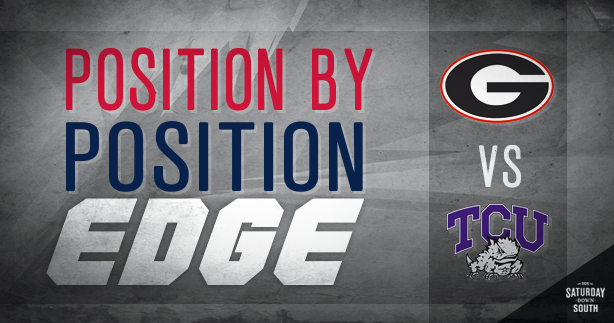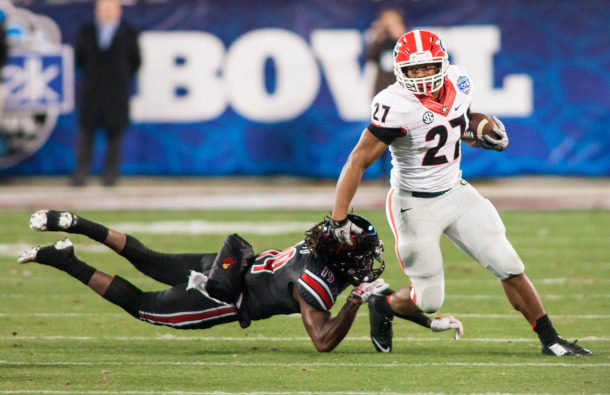
Position edge: Georgia vs. TCU in Liberty Bowl
Georgia ended its regular season on a sour note but has one final chance to build momentum in the Liberty Bowl on Friday (noon Eastern, ESPN).
The bowl game will provide the opportunity for fans to gauge just how much this young team has improved with the extra practice time. TCU is in many ways similar to Georgia and should present a nice challenge.
Many fans aren’t familiar with this new foe, however, so let’s break down how these two teams stack up to one another.
When Georgia has the ball
QB Jacob Eason vs. TCU pass defense: Eason made strides during his first season but never truly put it all together. The bowl game is an opportunity for Eason to play a complete game and provide some optimism heading into the offseason.
He will face an interesting TCU secondary that, like Eason, has improved throughout the season. The Horned Frogs are near the bottom in terms of pass defense, allowing 245.2 yards per game, which is on par with Vanderbilt’s defense. They found their groove near the end of the year, however, allowing an average of 217 yards in their last six games after giving up 273 yards per game in their first six.
Of much more concern to Georgia is TCU’s ability to rush the passer. Given the Bulldogs’ struggles up front, this could turn into a long day for Eason. Defensive end Josh Carraway leads the Horned Frogs with eight sacks. TCU, which is 10th in the nation with 40 sacks, generates most of its pressure with its defensive line.
This one is tough to call and could come down to how much Eason has improved over the break, but TCU’s ability to rush the passer gives them the edge.
Edge: TCU
Nick Chubb (below) & Co. vs. TCU run defense: The Bulldogs should have a much easier time finding room to run. Chubb and Sony Michel are coming back to Georgia with a mission to leave this program in good shape, and they will look to set that tone in the bowl game.
Georgia didn’t have the usual success on the ground that it has enjoyed in recent years, but some of that can be attributed to Chubb’s recovery from his knee injury. He looked much better near the end of the season, however, and should be at 100 percent from here on out. The offensive line could still be an issue in this aspect of the game, but they have had success in the run game for the most part.

Credit: Jeremy Brevard-USA TODAY Sports
TCU is 73rd nationally in rush defense and allows 182.75 yards per game. Georgia averages 186.5 yards on the ground, but the potential is there for much more. Chubb and Michel should have success in this one.
Edge: Georgia
UGA WRs vs. TCU secondary: Injuries played a large role in TCU’s slow start in the secondary. Second team All-Big 12 selection Ranthony Texada was getting his confidence back after a devastating knee injury and his fellow cornerback, Julian Lewis, missed the beginning of the year with an injury.
The Horned Frogs don’t have much size in their secondary, but they are good at playing the ball. Texada and safety Denzel Johnson are the ones to look out for and could prove successful against Georgia’s receivers. On the perimeter, Riley Ridley is the player Bulldogs’ fans should keep their eye on. Like his fellow freshmen, Ridley made some plays down the stretch and he looks like he could have a nice role moving forward.
In this game, Isaac Nauta could have the best outing. He has a rare size and speed combo that most college tight ends can’t match. Nauta should make his fair share of plays, but the other receivers could struggle.
Edge: TCU
When TCU has the ball
QB Kenny Hill vs. UGA pass defense: The former Texas A&M quarterback had a relatively successful first season at TCU. Hill completed 60.8 percent of his passes for 3,062 yards and 15 touchdowns, but threw 13 interceptions. A threat with his legs as well, Hill rushed for 537 yards and nine more scores.
Hill was largely inconsistent, and his mistakes put TCU in some tough spots. Gary Patterson’s offense relies heavily on a passing attack, though, and it will test the improvements Georgia made in the secondary.
The Horned Frogs have a deep stable of receivers and will look to attack any weaknesses that the Bulldogs might have. Given Hill’s inconsistency, however, Georgia may be able to get some turnovers.
Edge: Georgia
RB Kyle Hicks (below) vs. UGA run defense: TCU doesn’t run the ball as often as it passes, but Hicks has been effective on the ground. One of the most reliable players for the Horned Frogs, Hicks has nearly 1,000 rushing yards and 12 touchdowns. He’s also an adept receiver and has 396 yards with two touchdowns as a pass-catcher.

Credit: Ray Carlin-USA TODAY Sports
TCU is 46th in the nation in rushing offense and averages 196.67 yards per game. Much of that comes from the combination of Hicks and Hill. The Bulldogs surrender just 141.08 yards per game to opposing rushing attacks and that number is inflated after facing two option-based offenses.
Hicks is a talented back who can create something out of nothing. He’s got the speed to take any carry to the house and is electric in the open field. Georgia will need to be sound, but it has fared well against similar backs this season.
Edge: Georgia
TCU WRs vs. UGA secondary: Taj Williams leads all TCU receivers with 702 yards and five touchdowns on 39 catches. The Horned Frogs are deep at receiver and nine players have caught at least 10 passes for 100 yards or more.
Georgia’s secondary had some problems to begin the year but showed improvement as the season progressed. Deandre Baker is one such player who really grew throughout the course of the season, and he will be an important player at corner for the Bulldogs. Because of the Horned Frogs’ depth at receiver, Georgia may be stretched thin in the secondary.
Maurice Smith should help counter that depth, but there will be matchups for Hill and the TCU offense to exploit.
Edge: TCU
Special teams
Special teams has been a major problem area for the Bulldogs all season. Things have gotten better of late, but there are a lot of weaknesses. Rodrigo Blankenship emerged as a bright spot and is the likely kicker moving forward, but he was one of the few positives.
TCU is better than Georgia in nearly all aspects of special teams. The Horned Frogs aren’t a lethal group in any one particular area, but they have a good return game and are adequate in the kicking aspects.
Edge: TCU
William McFadden covers the University of Georgia for Saturday Down South. For news on everything happening between the hedges, follow him on Twitter @willmcfadden.
